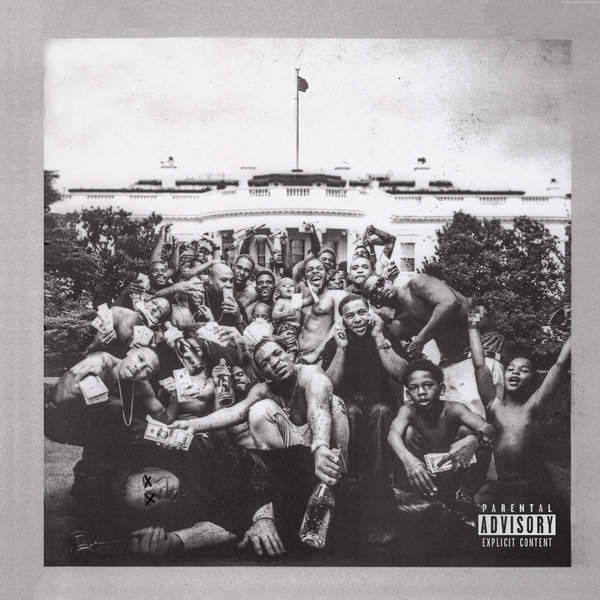When Kendrick Lamar’s formidable single ‘The Blacker The Berry’ dropped last month, it blew all fears of a radio-friendly album out of the water, presenting the flip side of ‘i’s evangelical self-love and foreshadowing a release boiling over with racial and political tension. The subsequent unveiling of the cover art made Lamar’s mission statement clear; his gaze had turned from the troubled streets of his native Compton to America at large. Where good kid m.A.A.d city followed a reasonably linear autobiographical narrative, To Pimp A Butterfly erupts into a thousand different strands at once, forming an unwieldy, gargantuan collage of conversations that would be a disaster in less capable hands.
This latest effort sees Lamar all but discard the trap sound that characterised some of good kid m.A.A.d city‘s most emotive tracks: the last remnants of 808-sounding drums cling on for dear life in ‘Alright’ and ‘Hood Politics’, while bleak, cinematic strings find their only home in the latter. His new direction incorporates more live instruments, often capturing the kind of classic soul sound that’s hardly been touched on in hip-hop since Outkast. This comes courtesy of a new host of collaborators including genre-hopping bassist Thundercat, neo-soul singer Bilal, and jazz pianist Robert Glasper, who lend the tracks a free-form, 70s funk and jazz inspired fluidity. Flying Lotus is another new addition to the roster; while he only produced one track his influence can be heard throughout the album’s sprawling 80 minutes, with flourishes of discordant piano and eerily warped psychedelia bursting out of its idiosyncratic arrangements.
When Lamar’s voice first chimes in on opener ‘Wesley’s Theory’ with "At first I did love you/but now I just wanna fuck", he’s not talking about Sharane from good kid m.A.Ad city, or any girl for that matter – he’s talking about his relationship with fame and success and the risk they could place on his integrity. The parallels he draws between romantic love/sex and the music industry recur throughout To Pimp A Butterfly and inform its title; a play on Harper Lee’s To Kill A Mockingbird that alludes to the commodification of artistic talent.
For all the fame and fortune that good kid brought him, Lamar remains introspective and self-critical – ‘U’ sees him address his issues with depression and self-doubt in uncomfortably plain-spoken terms: "You fuckin’ failure you ain’t no leader" he roars in a tirade of devastating self-talk, descending into a theatrically anguished style of delivery that sounds like he’s on the brink of tears. Among his torments, he blames himself for not being a bigger influence in his teenage sister’s life: "you preached in front of 100,000 but never reached her." His sense of personal responsibly extends far beyond his loved ones though; Trayvon Martin’s death at the hands of George Zimmerman was the impetus behind ‘The Blacker The Berry’ which rails against racial hatred while simultaneously pointing fingers at himself and the black community for acts of violence among themselves – "Why did I weep when Trayvon was in the street, when gang banging make me kill a n***a blacker than me? Hypocrite!"
Along with gritty, socially conscious themes, the album has some otherworldly ideas up its sleeve – Lamar raps as god in the allegorical ‘How Much A Dollar Cost?’, meets Lucifer ("Lucy") in a six part poem that unfolds over the course of the album, and stages a conversation with 2Pac from beyond the grave on ‘Mortal Man’; the departed rapper’s responses poached from a rare 1994 interview. The latter was guaranteed to irk some people, and at brief points Lamar does err on the side of self-indulgence, but for the most part his grandiosity is matched by his talent. A worthy follow up to its platinum-selling predecessor, To Pimp A Butterfly stands as a fearless and uncompromising manifestation of Lamar’s desire to push the culture of rap forwards – a crusade that’s as much in his blood as the city of Compton.


